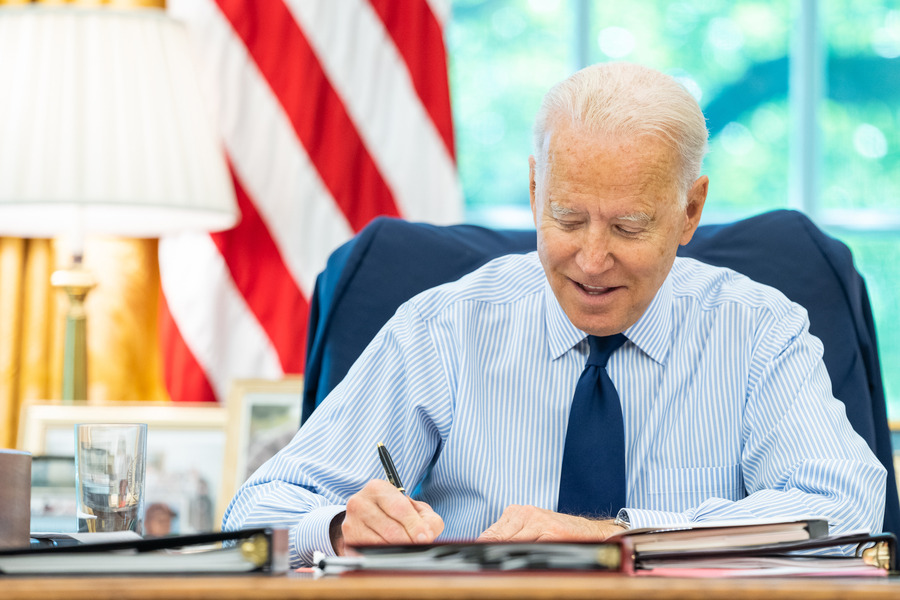Why the Solicitor General Should Ask the Supreme Court to Reverse the Fourth Circuit's Decision in Samantar
Consistent with my general tardiness, I neglected to report that on June 24, the Supreme Court requested the views of the Solicitor General regarding whether to grant cert in the Samantar case. (Mohamed Ali Samantar is the former Defense Minister of Somalia, who has been sued under the ATS and TVPA for human rights violations committed by troops under his command.) Although this will be a difficult case for the Obama Administration, the Solicitor General should urge the Supreme Court to reverse the
Published by The Lawfare Institute
in Cooperation With

Consistent with my general tardiness, I neglected to report that on June 24, the Supreme Court requested the views of the Solicitor General regarding whether to grant cert in the Samantar case. (Mohamed Ali Samantar is the former Defense Minister of Somalia, who has been sued under the ATS and TVPA for human rights violations committed by troops under his command.) Although this will be a difficult case for the Obama Administration, the Solicitor General should urge the Supreme Court to reverse the Fourth Circuit’s decision. The Fourth Circuit’s surprising conclusion “under international and domestic law” that foreign government officials are not entitled to official acts immunity for alleged jus cogens violations is inconsistent with U.S. and international law, and with the previously stated views of the Executive branch. Moreover, as I have previously explained here, it is likely to have serious adverse foreign and legal policy consequences for the Executive branch, including making the Fourth Circuit a magnet for lawsuits against foreign government officials and creating a precedent for reciprocal non-recognition of the immunity of U.S. Government officials in foreign countries.
The Fourth Circuit was simply wrong on the law. It based its finding of a jus cogens exception to official acts immunity on a “trend” it perceived in international and domestic law. The problem is that there is no such trend. Indeed, the panel itself acknowledged that “Some foreign national courts have pierced the veil of official-acts immunity to hear civil claims alleging jus cogens violations, but the jus cogens exception appears to be less settled in the civil context.” In fact, the only foreign court decision the panel cited finding a jus cogens exception was an Italian decision finding liability against Germany for war crimes during World War II. The Fourth Circuit cited no international civil cases against individuals finding a jus cogens exception for immunity for official acts. Moreover, Germany subsequently sued Italy in the International Court of Justice over the Italian decision, and in February of this year the ICJ ruled in favor of Germany, concluding that Italy had violated Germany’s sovereign immunity and that there is no jus cogens exception to sovereign immunity. Moreover, the ICJ found (para. 96) that a jus cogens exception to state immunity had been rejected by courts in the UK, Canada, Poland, Slovenia, New Zealand, and Greece and by the European Court of Human Rights. It is quite surprising that the Fourth Circuit could reach a conclusion “under international law” in face of so much evidence to the contrary.
Notwithstanding the absence of any trend in international law, the Fourth Circuit stated that “American courts have generally followed the foregoing trend, concluding that jus cogens violations are not legitimate official acts and therefore do not merit foreign official immunity…” Again, however, American courts have not “generally” recognized a jus cogens exception. Indeed, the Second Circuit has held in Matar v. Dichter (an ATS and TVPA suit against the former Israeli intelligence chief) that “[a] claim premised on the violation of jus cogens does not withstand foreign sovereign immunity.” In the Dichter case, the U.S. Government had argued in an amicus brief that “[t]he Executive does not recognize any exception to a foreign official’s immunity for civil suits alleging jus cogens violations . . . [and] the recognition of such an exception would be out of step with international law…”
I discuss the policy reasons the Solicitor General should seek reversal of the Fourth Circuit’s decision below the break.
Allowing a jus cogens exception to immunity to remain in the Fourth Circuit will create foreign policy problems for the U.S. Government. Plaintiffs will likely sue foreign government officials, including officials of close allies like Israel, under the TVPA (and under the ATS, to the extent it still applies), and the officials will (according to the Fourth Circuit) have no immunity for alleged jus cogens violations, even if the Executive branch has filed a Suggestion of Immunity. This will create a patchwork of immunity protections, with foreign government officials enjoying immunity in some circuits (like the Second Circuit) but not in the Fourth Circuit (where many foreign government officials land at Dulles International Airport). Although the suits may ultimately be dismissed, the officials will still be subjected to lengthy trials -- a problem the ICJ noted in its Germany v. Italy decision, if immunity were not recognized at the outset.
The Executive branch should also be concerned that the Fourth Circuit concluded that federal courts are not bound by Executive branch determinations of immunity and non-immunity for official acts by foreign government officials. The Executive branch has argued repeatedly that its immunity determinations are binding on the judicial branch, and it should be loath to acquiesce in the Fourth Circuit’s conclusion to the contrary. It will also be a practical problem for the Executive branch for its immunity suggestions to be binding in some circuits, but not others.
But the most serious consequence of creating a jus cogens exception to immunity is the reciprocal risk it would create for U.S. officials in other countries. The U.S. Government would have no basis to complain if U.S. officials were sued in other countries and foreign governments or courts concluded that they did not have immunity for jus cogens violations. For this reason, in its brief to the Second Circuit in Dichter, the Justice Department argued that recognition of a jus cogens exception by U.S. courts “could prompt reciprocal limitations by foreign jurisdictions, exposing U.S. officials to suit abroad on that basis.” The risk to U.S. government officials is especially great, given the breadth of U.S. military and intelligence actions around the world. It would be especially unwise for the Obama Administration to encourage an exception to immunity for jus cogens violations while continuing to launch numerous drone strikes, which some countries and human rights groups consider to be war crimes or crimes against humanity.
Finally, although the State Department’s original Suggestion of non-immunity for Samantar was based largely on the absence of a recognized government in Somalia with legal authority to assert immunity for government officials, earlier this year the Obama Administration formally recognized the government in Somalia, and the government promptly requested immunity for Samantar. Although some have suggested that Samantar should not enjoy immunity because he has taken up residence in this country (which does not in any case constitute an exception to immunity under international law), the Obama Administration should still be concerned about the reciprocal consequences for U.S. officials of ignoring an assertion of immunity by a foreign government.
I have discussed the Dichter case and the problems with a jus cogens exception for official acts immunity in greater detail in this article in the Vanderbilt Journal of Transnational Law.
John B. Bellinger III is a partner in the international and national security law practices at Arnold & Porter in Washington, DC. He is also Adjunct Senior Fellow in International and National Security Law at the Council on Foreign Relations. He served as The Legal Adviser for the Department of State from 2005–2009, as Senior Associate Counsel to the President and Legal Adviser to the National Security Council at the White House from 2001–2005, and as Counsel for National Security Matters in the Criminal Division of the Department of Justice from 1997–2001.





